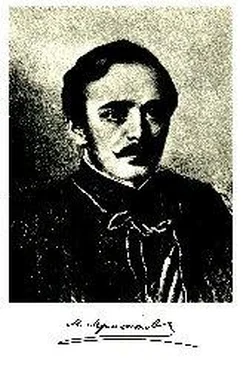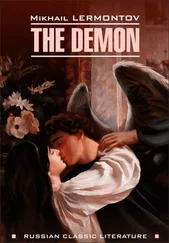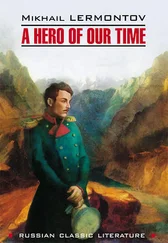The captain fell silent.
"I might as well confess," he said after a while, tugging at his mustache, "I was annoyed because no woman had ever loved me like that."
"How long did their happiness last?" I asked.
"Well, she admitted that Pechorin had often appeared in her dreams since the day she first saw him and that no other man had ever made such an impression on her. Yes, they were happy!"
"How boring!" I exclaimed involuntarily. Indeed, I was expecting a tragic end and it was a disappointment to see my hopes collapse so suddenly. "Don't tell me the father didn't guess she was with you in the fort?"
"I believe he did suspect. A few days later, however, we heard that the old man had been killed. This is how it happened…"
My interest was again aroused.
"I should tell you that Kazbich had the idea that Azamat had stolen the horse with his father's consent, at least, so I think. So he lay in ambush one day a couple of miles beyond the village when the old man was returning from a futile search for his daughter. The old man had left his cohorts lagging behind and was plunged deep in thought as he rode slowly down the road through the deepening twilight, when Kazbich suddenly sprang catlike from behind a bush, leapt behind him on the horse, cut him down with a blow of his dagger and grabbed the reins. Some of his men saw it all from a hill, but though they set out in pursuit they couldn't overtake Kazbich."
"So he compensated himself for the loss of his horse and took revenge as well," I said in order to draw an opinion out of my companion.
"Of course he was absolutely right according to their rules," said the captain.
I was struck by the ability of this Russian to reconcile himself to the customs of the peoples among whom he happens to live. I don't know whether this mental quality is a virtue or a vice, but it does reveal a remarkable flexibility and that sober common sense which forgives evil wherever it feels it to be necessary, or impossible to eradicate.
Meanwhile we had finished our tea. Outside, the horses had been harnessed long since and were now standing shivering in the snow; the moon, becoming pale in the western sky, was about to immerse itself in the black clouds that trailed like tattered bits of a torn curtain from the mountain peaks in the distance. We stepped out of the hut. Contrary to my companion's prediction, the weather had cleared and promised a calm morning. The dances of stars, intertwined in a fantastic pattern in the distant heavens [54] the Russian word is the same for heaven, sky, or firmament.
, went out one after another as the pale glimmer of the east spread out over the dark lilac sky, gradually casting its glow on the steep mountainsides blanketed by virginal snow. To right and left yawned gloomy, mysterious abysses, and the mist, coiling and twisting like a snake, crawled into them along the cracks and crevices of the cliffs as if in fearful anticipation of the coming day.
There was a great peace in the heavens and on earth as there is in one's heart at a morning prayer. Only now and then the cool east wind came in gusts, ruffling the hoary manes of the horses. We set out, the five lean nags hauling our carriages with difficulty along the tortuous road up Mount Gud. We walked behind, setting stones under the wheels when the horses could pull no longer; it seemed as if the road must lead straight to heaven, for it rose higher and higher as far as the eye could see and finally was lost in the cloud that had been resting on the mountain summit since the day before, like a vulture awaiting its prey. The snow crunched underfoot; the air grew so rare that it was painful to breathe; I continually felt the blood rushing to my head, yet a feeling of elation coursed through my being and somehow it felt good to be so far above the world-a childish feeling, I admit, but as we drift farther away from the conventions of society and draw closer to nature we become children again whether we wished to or not-the soul is unburdened of whatever it has acquired and it becomes what it once was and what it will surely be again. Anyone who has had occasion, as I have, to roam in the desolate mountains, feasting his eyes upon their fantastic shapes and drinking in the invigorating air of the gorges, will understand my urge to describe, to portray, to paint these magic canvases. Ar least we reached the summit of Mount Gud and paused to look around us; a gray cloud rested on the mountain top and its cold breath held the threat of an imminent blizzard; but the east was so clear and golden that we, that is, the captain and I, promptly forgot about it... Yes, the captain too: for simple hearts feel the beauty and majesty of nature a hundred times more keenly than do we, rapturous tellers of stories spoken or written.
"You are no doubt accustomed to these magnificent scenes,' I said to him.
"Yes, sir, you can get accustomed even to the whining of bullets, I mean, accustomed to concealing the involuntary acceleration of the heartbeat."
"On the contrary, I have been told that to some old soldiers it is sweet music."
"Yes, it is sweet too, if you please-but only because it makes the heart beat faster. Look," he added, pointing to the east, "what a country!'
Indeed it was a panorama I can hardly hope to see again: below us lay the Koishaur Valley, the Aragva and another river tracing their course across it like two silver threads. A bluish mist crept over it, seeking refuge in the neighboring gorge from the warm rays of the morning. To the right and to the left the mountain ridges, one higher than the other, crisscrossed and stretched out into the distance covered with snow and shrubs. Mountains as far as the eye could see, but no two crags alike-and all these expanses of snow burned with a rosy glow so merry and so vivid that one wanted to stay there for ever. The sun barely showed from behind a dark-blue mountain which only the experienced eye could distinguish from a storm cloud, but above it stretched a crimson belt to which my comrade now drew my attention. "I told you," he exclaimed, "there's bad weather ahead. We'll have to hurry or it may catch us on the Mountain of the Cross. Get going, there!" he shouted to the coachmen.
Chains were passed through the wheels for brakes to prevent them from getting out of control. Leading the horses by their bridles we began the trip down. To the right of us was a cliff, and to the left an abyss so deep that an Ossetian village at the bottom looked like a swallow's nest. I shuddered at the thought that a dozen times a year some courier rides through the dark night along this road too narrow for two carts to pass, without getting off his jolting carriage. One of our drivers was a Russian peasant from Yaroslavl, the other an Ossetian. The Ossetian took the leading horse by the bridle after unhitching the first pair in good time and taking every other possible precaution, but our happy-go-lucky Russian didn't even bother to get down from the box. When I suggested that he might have shown some concern, if only for my suitcase, which I had no desire to go down into the abyss to recover, he replied: "Don't worry, sir! With God's help we'll get there just as well as they. This is not the first time we've done it." And he was right-true, we might not have got through safely, yet we did. And if all men gave the matter more thought they would realize that life is not worth worrying over too much...
Perhaps you wish to hear the story of Bela to the end? Firstly, however, I am not writing a novel but simply travel notes, and hence I cannot make the captain resume his story sooner than he actually did. So you will have to wait, or, if you wish to do so, skip a few pages; only I do not advise you to, for the crossing of Mount Krestovaya, Mountain of the Cross (or le Mont St Christophe as the learned Gamba [55] Gamba, French diplomat to Georgia, travel writer (1826), misinterpreted Mount Krestovaya (Mount of the Cross, from Russian "krest" or cross) as "Mount Saint Christopher."
calls it) is worthy of your interest. And so we descended from Mount Gud to Chertova Valley. There's a romantic name for you! Perhaps you already visualize the den of the Evil Spirit among the inaccessible crags-but if you do, you are mistaken: Chertova Valley derives its name from the word cherta [line or boundary] and not chort [devil], for the boundary of Georgia once passed here. The valley was buried under snow drifts which gave the scene a rather strong resemblance to Saratov, Tambov [56] prosaic central Russian provincial cities.
and other spots dear to us in our mother country.
Читать дальше

![Михаил Лермонтов - A Hero of Our Time [New Translation]](/books/27671/mihail-lermontov-a-hero-of-our-time-new-translati-thumb.webp)










